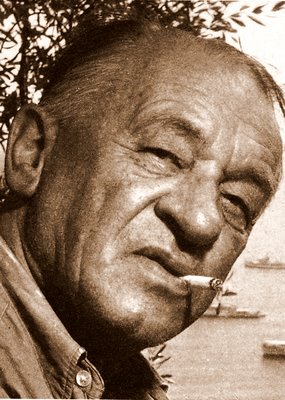Blaise Cendrars (Blaise Cendrars)

Author. Real name Frédéric Louis Sauser. An innovator in poetry and prose, he had a significant impact on French literature before and after World War I. His novels “Gold” (aka “Sutter’s Gold”, 1925) and “Moravagine” (1926) have been translated into over 20 languages. Cendrars was born in La Chaux-de-Fonds, Neuchâtel, Switzerland. At 15 he was kicked out of school for poor grades and ran away to begin a life of restless travel. By his own accounts he was a jeweler’s apprentice in Russia, a train stoker in China, and worked odd jobs in Africa and the Middle East, though the autobiographical element in his writings cannot be trusted because he habitually fictionalized his life and encounters with others. (“Truth is imaginary”, he claimed). He began writing around 1906 and created his pseudonym, Cendrars, by combining the French word for ashes (“cendres”) and the Latin “ars” (“art”). Following a visit to the United States he moved to Paris in 1912, bringing with him his first great poem, “Easter in New York”; its snapshot imagery and jazzy syncopated rhythms created a stir among the Parisian avant-garde, as did his experimental piece “The Prose of the Transsiberian and of the Little Jehanne of France” (1913). Poet and critic Guillaume Apollinaire proclaimed him a genius and was probably influenced by him. At the beginning of WWI Cendrars joined the French Foreign Legion and lost his right arm in the Second Battle of Champagne in 1915, for which he was awarded French citizenship. In the postwar years he resumed traveling (this time to North and South America) and dabbled in film, acting as Abel Gance’s assistant on “J’Accuse” (1919) and “La Roue” (1923), and directing a feature in Italy, “La Venere nera” (1923). His important verse of the period includes the long poem “Panama” (1918) and the collections “Elastic Poems” (1919), “The Entire World” (1919), and “Documentaries” (1924). The need for a steady income led him to abandon poetry for novel-writing after 1927 but his style remained unorthodox and original, blending reportage, travelogue, fantasy, science fiction and humor in the novels “Le Plan de l’Aiguille” (1927), “The Confessions of Dan Yack” (1929), and “Rhum” (1930). The 1930s saw a decline in his output just as he was beginning to gain an international reputation through English translations of his work by John Dos Passos and praise from Hemingway and Henry Miller; but he rebounded during World War II, which he spent in occupied Paris under Nazi surveillance as a “subversive” writer. What emerged were four brilliant volumes of “memoirs”, published after the Allied victory: “The Astonished Man” (1945), “Lice” (1946), “Planus” (1948), and “Sky: Memoirs” (1949). In 1957 Cendrars suffered a stroke which left him virtually bedridden. Shortly before his death he was named a Commander of the Legion of Honor and awarded the Paris Grand Prize of Literature for lifetime achievement. He died in the French capital and was buried at the Batignolles Cemetery. In 1994 his remains were reinterred in the village of Tremblay-sur-Mauldre, Yvelines, where he had a country retreat for many years. (bio by: Bobb Edwards)
Born
- September, 01, 1887
- Switzerland
Died
- January, 01, 1961
- France
Cemetery
- Batignolles Cemetery
- France

